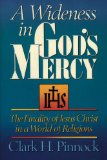A Wideness in God’s Mercy: The Finality of Jesus Christ in a World of Religions. By Clark H. Pinnock. Grand Rapids: Zondervan Publishing House, 1992. 217 pp. Paper, $16.99.
Clark Pinnock writes in response to John Hick’s pluralism and the exclusivism of most Evangelicals. His book has two main parameters within which he feels a theology of religions should operate. The first is that God loves all mankind and desires to save them. This should produce optimism that many will be saved. The second axiom is that Jesus Christ is Lord and the only basis on which men are saved. Christ is the basis for salvation but people don’t need to know about Him in order to receive the eternal life He provided. These two axioms form his first two chapters. The first chapter proves only that God desires the salvation of mankind. Unfortunately, Pinnock feels that this is evidence that God will save people who do not have a specific knowledge of Christ. However, the passages only say that God desires them to be saved. There are other passages that point out that salvation comes only through Jesus Christ (John 14:6; Acts 4:12). The second chapter is a good refutation of John Hick’s Christology affirming that Christ is the basis for the salvation of all humanity.
The third chapter discusses the distinction between subjective and objective religion. This is an important part of Pinnock’s theology, allowing him to say that people who respond subjectively to God (faith, piety, worship, and fear of God) can be saved even though they know nothing of Christ and are in a false religion. He believes they are saved because they responded to the revelation that they did receive. Two major problems he never addresses in his view are: (1) He smuggles the God of the Judeo-Christian tradition in through the back door. How can a Hindu really respond to the God of the Bible when his concept of God is totally different? (2) The second objection is similar in that it’s difficult to see how an unbeliever would be able to choose the correct beliefs about God out of a false religion. The distinctions between subjective and objective faith are overemphasized. People exercise their subjective faith in the context of their objective faith (the religion itself). Their concept of God and everything else is shaped by their belief system. Pinnock never addresses these insurmountable problems with his view. In fact, when these people do respond to the God of the Bible they have taken their first step away from their religion!
The fourth chapter discusses the need to dialogue with the adherents of other religions. Through dialogue we can understand them better and build bridges into their religion so that we can reach them with the Gospel of Christ.
The last chapter is the author’s view of how men who have never heard about Christ can be saved. He couples his view of subjective faith with what is called the “faith-principle.” In Pinnock’s system “faith” is almost completely empty of content. This is necessary so that people of other religions can be saved. He uses Abel, Noah, Job, Melchizedek, Abram, Jethro, and other OT figures as evidence that people can be saved without a specific knowledge of Christ. The main problem with his examples is that none of these people was saved by natural revelation: all responded to special revelation, oral or written. He also assumes that they were adherents of other religions. This, however, is false. While not part of Judaism, which had not started yet, they did believe in the special revelation God had given to them as well as their predecessors. They were worshipers of Yahweh and not adherents of false religions.
Pinnock also argues that since babies and mentally incompetent people are saved apart from believing in Christ so are those who have never heard. But there is a big difference between people who are unable to believe and those who are mature and reject the light God has given them (Rom 1:18-19ff.).
This book has made quite an impression in the academic community. For those interested in defending specific knowledge of Jesus Christ as necessary in order to receive eternal life, it is must reading.
R. Michael Duffy
Missionary
The Hague
Netherlands

